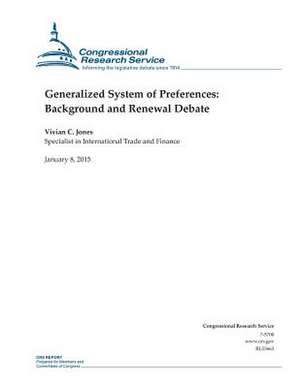Generalized System of Preferences
Autor Congressional Research Serviceen Limba Engleză Paperback
Preț: 121.34 lei
Nou
Puncte Express: 182
Preț estimativ în valută:
23.23€ • 23.89$ • 19.27£
23.23€ • 23.89$ • 19.27£
Carte disponibilă
Livrare economică 27 ianuarie-10 februarie
Preluare comenzi: 021 569.72.76
Specificații
ISBN-13: 9781507544419
ISBN-10: 1507544413
Pagini: 38
Dimensiuni: 216 x 279 x 2 mm
Greutate: 0.11 kg
Editura: CREATESPACE
ISBN-10: 1507544413
Pagini: 38
Dimensiuni: 216 x 279 x 2 mm
Greutate: 0.11 kg
Editura: CREATESPACE
